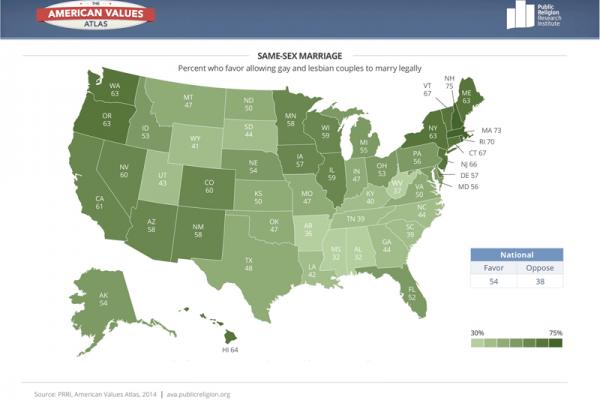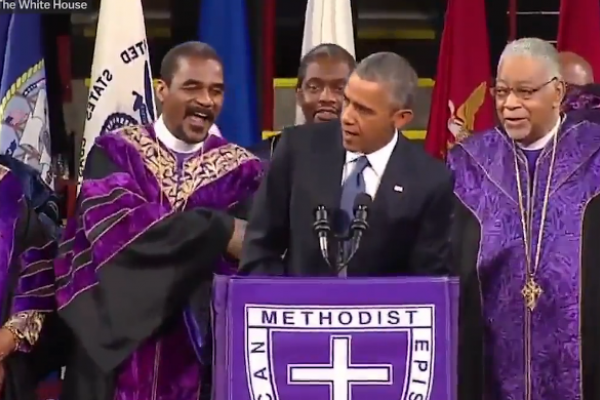The Supreme Court ruling June 26 to legalize gay marriage rested in pragmatic legal reasoning, the same approach in the June 25 ruling on the Affordable Care Act — the decision that saved Obamacare from a “death spiral.”
Justice Anthony Kennedy, author of the majority opinion in the 5-4 decision, described equal protection under the law as an inevitable step in the evolution of changing understandings of marriage across the centuries and essential for the safety and dignity of thousands of gay and lesbian couples and their children.
The Supreme Court ruling June 26 to legalize gay marriage rested in pragmatic legal reasoning, the same approach in the June 25 ruling on the Affordable Care Act — the decision that saved Obamacare from a “ death spiral.”
Justice Anthony Kennedy, author of the majority opinion in the 5-4 decision, described equal protection under the law as an inevitable step in the evolution of changing understandings of marriage across the centuries and essential for the safety and dignity of thousands of gay and lesbian couples and their children.
In the days before the Supreme Court made it possible for gay couples to marry everywhere in the U.S., we asked two couples of faith — one Jewish who live in a state that forbids gay marriage, and one Christian and opposed to gay marriage — what the decision would mean to them.
The interfaith element of the pope’s environmental message was reflected in the diverse range of religious leaders present.The interfaith element of the pope’s environmental message was reflected in the diverse range of religious leaders present.Religious leaders from across the globe led a “Many Faiths – One Planet” march to the Vatican on June 28, to show their support of Pope Francis’ groundbreaking environmental encyclical.
Organizers estimated a crowd of 5,000 people reached St. Peter’s Square to celebrate the pontiff’s tough stance on climate change, after parading through Rome under a canopy of painted banners.
The Constitution was born within a worldview hospitable to transformation and open to corrections of injustices in letter and spirit. Examples abound: women’s right to vote, interracial marriage, the right to open legislative deliberations with prayer, and the right to education without segregation.
The Constitution has never claimed to be, in itself, the last word. Rather, it has claimed to be the first.
While I will not propose that every decision the Supreme Court has made has been for the betterment of all people, today’s ruling on same-sex marriage is an example of a nation reforming itself for the better.
1. You Must Read the Last Paragraph of Justice Kennedy’s Same-Sex Marriage Opinion
Well, and all of it, at the link.
2. WATCH: President Obama Sings ‘Amazing Grace’ to Close His Eulogy in Honor of Charleston Victim Reverend Clementia Pinckney
You'll need some tissues for this one.
3. We Need to Talk About White Culture
In his column for The Daily Beast, Sojourners board member, Joshua DuBois writes: “My brothers and sisters from the majority culture—White Americans—need to have the courage to drive this dialogue, and help us find some answers.”
After delivering a stirring eulogy on Friday for Rev. Clementa Pinckney, President Obama paused and simply said “Amazing Grace.” As the audience held its breath in expectation, perhaps waiting for another profound spiritual word on “grace,” the president broke out in song. The ministers of Emanuel A.M.E. seated behind President Obama immediately laughed with joy and jumped up as the entire congregation sang the course of the famous hymn.
Following the Supreme Court’s ruling today that “same-sex couples may exercise the fundamental right to marry in all States,” many wondered how Christian leaders in the U.S. would react.
But despite lingering stereotypes, many religious folk in the U.S. are now supportive of same-sex marriage. In fact, a recent survey found that “among religiously affiliated Americans, supporters today actually outnumber opponents.”
Below, read some of the responses from Christian leaders — including evangelicals, Catholics, and Protestants — who have expressed their joy and support for today’s Supreme Court ruling, as well as the work left to be done towards full LGBTQ inclusion in our nation and churches.
The debate is over.
In a landmark decision, the Supreme Court decided this morning that marriage was a fundamental right for all couples regardless of gender. All Americans who wish to can now marry the same-sex partner they love. Every state law that bans such marriages is now dead. And it is over. It is finished. This debate, at long last, is done.
This is a good day to be present. I want to document this day into my memory, so I might tell my children about it later. Although at 25 I can’t possibly understand all this decision entails, there may be a day down the road when I stand tuxedoed and teary-eyed and holding the hands of another, and I want this memory to color that moment. I want to feel the gift of it.
But this day also brings up a lot of complicated feelings for me, too. I am, after all, a follower of Jesus, and many in this family of Christians are not celebrating with me. They are unsure of what to say, uncertain of what the future holds.
It is painfully true that in our time, in this year, in the United States, there is still no safe space for black people in America — even in their own churches. Racism is America’s original sin. It expresses itself explicitly and overtly in what we horribly saw last week in a black church, but racism continues on, implicitly and covertly, in American institutions and culture.
Gay couples have a legal right to marry, SCOTUS ruled today.
“The court now holds that same-sex couples may exercise the fundamental right to marry. No longer may this liberty be denied to them,” wrote Justice Anthony Kennedy, the Washington Post reports.
The 5-4 ruling comes as a legal confirmation of the rapidly changing tide of public sentiment towards legalizing same-sex marriage, which was legal in only four states until the last five years, but saw 33 more states rule in favor since 2010.








